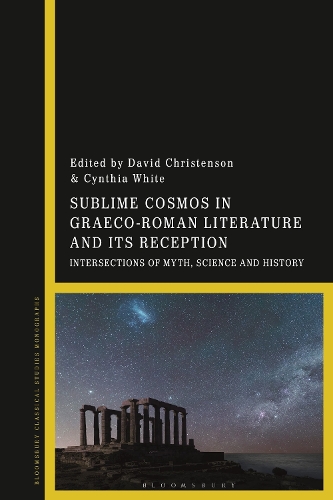
Sublime Cosmos in Graeco-Roman Literature and Its Reception: Intersections of Myth, Science and History
(Paperback)
Publishing Details
Sublime Cosmos in Graeco-Roman Literature and Its Reception: Intersections of Myth, Science and History
By (Author) Professor David Christenson
Edited by Cynthia White
Bloomsbury Publishing PLC
Bloomsbury Academic
30th October 2025
United Kingdom
Classifications
Professional and Scholarly
Non Fiction
Social and political philosophy
Religion and science
Literary studies: ancient, classical and medieval
880.09
Physical Properties
Paperback
248
Width 156mm, Height 234mm
Description
The essays collected in this volume examine manifestations of our sublime cosmos in ancient literature and its reception. Individual themes include religious mystery; calendrical and cyclical thinking as ordering principles of human experience; divine birth and the manifold nature of divinity (both awesome and terrifying); contemplation of the sky and meteorological (ir)regularity; fears associated with overpowering natural and anthropogenic events; and the aspirations and limitations of human expression. In texts ranging from Homer to Keats, the volumes chapters apply diverse critical methods and approaches that engage with sublimity in various aesthetic, agential and metaphysical aspects. The ancient texts epic, dramatic, historiographic and lyric treated here are rooted in a remote world where, within a framework of (perceived) celestial order, literature, myth and science still communicated profoundly, a tradition that continued in literary receptions of these ancient works.
This volume honours the intellectual legacy of Thomas D. Worthen, a scholar whose expertise and insights cut across multiple disciplines, and who influenced and inspired students and colleagues at the University of Arizona, USA, for over three decades. Beyond clarifying temporally and culturally distant contemplations of the human universe, these essays aim to inform the continuing sense of wonder and horror at the sublime heights and depths of our ever-changing cosmos.
Reviews
This is an excellent study of the idea of the sublime cosmos in ancient Greco-Roman thought: wide ranging, informative, up to date, methodologically diverse and dealing with interesting intersections of myth, history and science. -- Andrew Gregory, Professor of History and Philosophy of Science, University College London, UK
Author Bio
David Christenson is Professor of Classics at the University of Arizona, USA. He is the author of eight books, including Plautus: Casina (Bloomsbury, 2019).
Cynthia White is Professor of Classics at the University of Arizona, USA, and is a Fellow of the American Academy in Rome, Italy.
